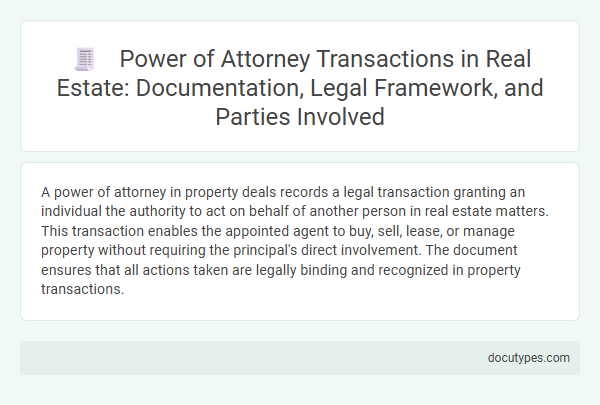A power of attorney in property deals records a legal transaction granting an individual the authority to act on behalf of another person in real estate matters. This transaction enables the appointed agent to buy, sell, lease, or manage property without requiring the principal's direct involvement. The document ensures that all actions taken are legally binding and recognized in property transactions.
Introduction to Power of Attorney in Real Estate
A Power of Attorney in real estate transactions grants legal authority to an individual to act on behalf of another in property dealings. This document records specific transactions related to buying, selling, or managing real estate assets.
- Authorization of Agents - It formally authorizes an appointed agent to make decisions and sign documents in property transactions.
- Transfer of Property Rights - The document records the transfer or sale of real estate as authorized by the principal.
- Management of Real Estate - It enables agents to manage property affairs such as leasing or maintenance on behalf of the owner.
Your Power of Attorney ensures legal clarity and efficient handling of real estate matters when direct involvement is not possible.
Types of Power of Attorney Used in Property Transactions
What kind of transaction is recorded by a Power of Attorney in property deals? A Power of Attorney in property transactions authorizes a designated individual to act on behalf of the property owner. It commonly includes buying, selling, leasing, or managing real estate.
What types of Power of Attorney are used in property transactions? Durable Power of Attorney remains effective even if the principal becomes incapacitated, making it suitable for long-term property management. Limited Power of Attorney grants authority for specific property transactions like a single sale or purchase.
Key Legal Requirements for POA Documentation
A Power of Attorney (POA) in property deals records the authorization granted to an agent to act on behalf of the principal in legal transactions. This includes buying, selling, or managing real estate assets.
Key legal requirements for POA documentation include a clear and specific description of the powers granted, explicit identification of the principal and agent, and compliance with jurisdictional signing and notarization rules. Your POA must be executed in writing and often requires witnessing to be valid. Proper documentation ensures the transaction is legally binding and protects all parties involved.
Roles and Responsibilities of Parties Involved
A power of attorney in property deals records the authorization for an agent to act on behalf of the principal in real estate transactions. The principal grants specific powers to the agent, such as buying, selling, or managing property, ensuring legal representation without the principal's physical presence. The agent must act within the scope defined by the power of attorney, maintaining fiduciary duties and protecting the principal's interests throughout the transaction.
Standard Documentation for Power of Attorney in Real Estate
A Power of Attorney in property transactions authorizes an appointed individual to act on behalf of the property owner, enabling them to manage or complete real estate deals. Standard documentation for Power of Attorney in real estate includes a legally drafted document specifying the scope of authority, notarization, and registration with relevant property authorities. Your involvement is crucial to ensure the document accurately reflects the intended powers and complies with local laws.
Verification and Authentication Procedures for POA
A Power of Attorney (POA) in property deals records the authorization for one party to act on behalf of another in transactions such as buying, selling, or managing real estate. This legal document ensures that the agent can legally represent the principal in executing property-related agreements.
Verification and authentication procedures for a POA include notarization, where a notary public confirms the identity of the principal and the voluntary signing of the document. Additionally, property registries often require submission of the original POA and may conduct further checks to confirm its validity before recording the transaction.
Common Legal Framework Governing POA in Property Deals
A Power of Attorney (POA) in property deals records the authorization granted to an agent to act on behalf of the principal in real estate transactions. It ensures legal consent for actions like buying, selling, or managing property under a defined legal framework.
- Representation Authority - The POA legally empowers the agent to carry out property transactions on your behalf, including signing documents and negotiating terms.
- Scope and Limitations - The legal framework specifies the extent of the agent's power, outlining which property-related actions are permitted or restricted.
- Compliance with Local Laws - POAs must adhere to jurisdiction-specific property laws and registration requirements to be valid and enforceable in property deals.
Risks and Legal Safeguards in POA Transactions
| Transaction Type Recorded by Power of Attorney (POA) | Power of Attorney in property deals authorizes an agent to act on behalf of the principal in buying, selling, leasing, or managing real estate. The POA records transactions like signing contracts, transferring property titles, and handling rental agreements. |
|---|---|
| Risks in POA Transactions |
|
| Legal Safeguards for POA Transactions |
|
| Recommendations for Property Owners | Carefully select your agent and define the scope of authority. Monitor transactions and notify relevant parties if you revoke the POA to minimize risks associated with property dealings under Power of Attorney. |
Revocation and Termination of Power of Attorney
A Power of Attorney in property transactions records the authority granted to an agent to act on behalf of the principal. It allows the agent to handle property deals, including buying, selling, or managing real estate assets.
Revocation of a Power of Attorney occurs when the principal withdraws the agent's authority, stopping any further actions under that document. Termination happens automatically upon events like the principal's death, the completion of a transaction, or the expiration of the document's timeframe.
What Kind of Transaction Is Recorded by a Power of Attorney in Property Deals? Infographic

